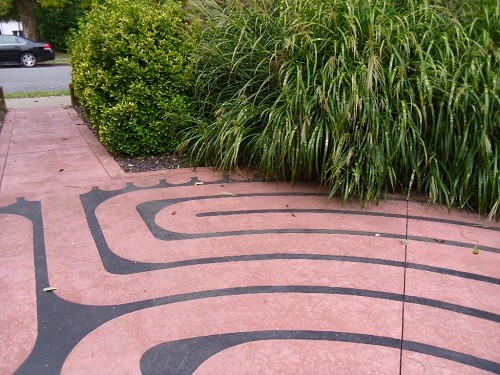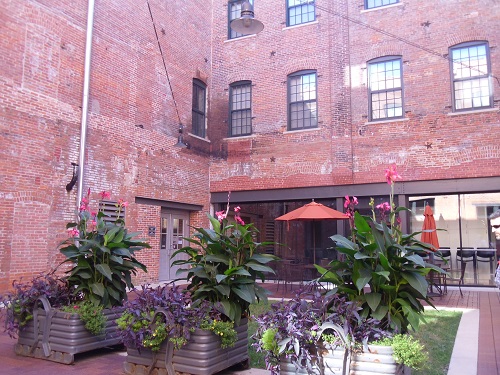| Back to Back Issues Page |
 |
|
Useful Community Plus August 27, 2020 |

 In keeping with the theme this month, above are a couple of ideas for relatively low-cost ways to create peaceful spaces in awkward gaps between buildings.
In keeping with the theme this month, above are a couple of ideas for relatively low-cost ways to create peaceful spaces in awkward gaps between buildings.
Every month a number of folks find our website by searching for "community development examples." In fact, most pages on our site give examples. This really general inquiry led us to a few coaching tips about how to find your own relevant examples. The most important word here is "relevant." Comparing yourself to places and initiatives that are much more or less successful than yours only results in frustration. First, find places within 100 miles of yours. You can take tour groups there and keep in touch with what is happening there over a period of years, which is the right time frame for community development. Try to choose places that share your culture, laws, landscape, general size and financial capability, and natural resource profile, each of which can be pivotal factors in deciding on community development strategies. Frankly, another advantage is that your local population will be more likely to receive the message if your comparison city seems local or regional than if you choose some place in another state, province, or nation. That's no small advantage when you are trying to sell a program. Second, we suggest narrowing your online searches. If you refine past "examples of traffic calming," an actual search that found our site this month, to include modifiers such as "large city," "small town," "urban neighborhood," "business district," "industrial park," "Midwest," "Germany," or "college campus," imagine how much more likely you are to find something you can relate to. Third, identify resource organizations that share geographic, philosophical, and economic similarities with your situation, and follow them on social media and through subscribing to newsletters. For instance, you may find that you identify with the Strong Towns initiative (kind of anti-car, pro-community, a bit contrarian), Asset-Based Community Development (using what you have and broadening your idea of what an asset is), C40 (world mega-cities concerned about climate change), or Community Heart and Soul, which helps small towns and cities organize themselves for success. Stick with one organization until you determine that it can't provide you with relevant examples. If you really want community development examples from our website, see especially the three community profiles on the community development principles page. Also the community development ideas page gives 19 sample projects large and small, the adaptive reuse page consists entirely of examples of what a former land use could become in its next life, the fall newsletter or email page gives ideas for autumn communications, as do the newsletter ideas pages for the other seasons. Particularly valuable sets of questions to ask can be found on our business retention visit page, housing condition survey page, and start a community garden page. Lastly, we make the unprecedented offer that if you can't find relevant examples, please reply to this newsletter to describe your issue. Between now and September 15, we will help you figure that out at no cost to you.
Speaking of examples, some very disparate articles commanded our attention this month. You may enjoy one of these. We are passionate about cleanups, small and large. The Delaware River cleanup should inspire if your cleanup target is on the large side. If you are in a small town, you may appreciate hearing about quilting as community building.. This highways to boulevards initiative is an ambitious, long-term project to make your city less reliant on fast-speed automobile traffic. Many of you actually live where one level of government is a financial parasite on another. Check out this article about how Lafayette Parish (County to the rest of you) is being funded largely by Lafayette city. Several of you will enjoy learning about Stir to Action, a British organization focused on co-ops, employee ownership, and economic revitalization in general. Let their ideas percolate even if you can't participate in the upcoming online festival. Our next monthly email will appear in September. Feel free to forward this email to a friend who may be interested, or to reply to this e-mail.
|
| Back to Back Issues Page |

